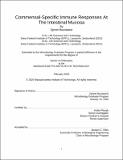Commensal-specific immune responses at the intestinal mucosa
Author(s)
Bousbaine, Djenet.
Download1237147228-MIT.pdf (9.332Mb)
Other Contributors
Massachusetts Institute of Technology. Department of Biology.
Advisor
Hidde Ploegh.
Terms of use
Metadata
Show full item recordAbstract
The intestinal mucosa harbors a dense community of microbes that breaks down polysaccharides indigestible by the host, synthesizes essential vitamins, stimulates maturation of the immune system, and outcompetes the growth of pathogenic species. In return, the host provides commensals with a habitat rich in energy derived from ingested food. The intestinal immune system faces the daunting task of maintaining homeostasis despite the enormous load and diversity of antigens present at this site. Failure to maintain this balance has dramatic consequences and can cause food allergies, inflammatory bowel disease or invasive infections. Peripherally-induced Foxp3⁺-regulatory T cells (pTregs) maintain immune homeostasis at the intestinal mucosa by regulating effector T cell responses against dietary antigens and microbes. Similarly to pTregs, a subset of small intestine intraepithelial lymphocytes CD4⁺CD8[alpha][alpha]⁺ (CD4[subscript IELs]) exhibit regulatory properties and promote tolerance against dietary antigens. In this thesis, I describe a new commensal-specific CD4+ T cell model obtained by somatic cell nuclear transfer using, as a donor, a single pTreg from the mesenteric lymph node. In chapter 1, I provide an overview of the interplay between the microbiota and the mucosal immune system. In chapter 2, we describe our newly developed model and use it to assess how the identity of the T cell receptor (TCR) affect the fate of a T cell. In chapter 3, I describe the antigen and epitope recognized by this transnuclear (TN) TCR and show that TN cells can protect against intestinal inflammation in a colitis model. In chapter 4, I describe how TN cells can also differentiate into T follicular helper and promote systemic responses. In chapter 5, we developed a strategy to target antigens to outer membrane vesicles (OMVs) of Bacteroides and thereby assess the antigen-specific responses to OMVs. In chapter 6, I provide concluding remarks and discuss future prospective for our findings. In the appendix, I describe a new mouse model to site-specifically label and track the B cell receptor of primary B cells.
Description
Thesis: Ph. D. to the Microbiology Graduate Program, Massachusetts Institute of Technology, Department of Biology, February, 2020 Cataloged from student-submitted PDF of thesis. Includes bibliographical references.
Date issued
2020Department
Massachusetts Institute of Technology. Department of BiologyPublisher
Massachusetts Institute of Technology
Keywords
Biology.